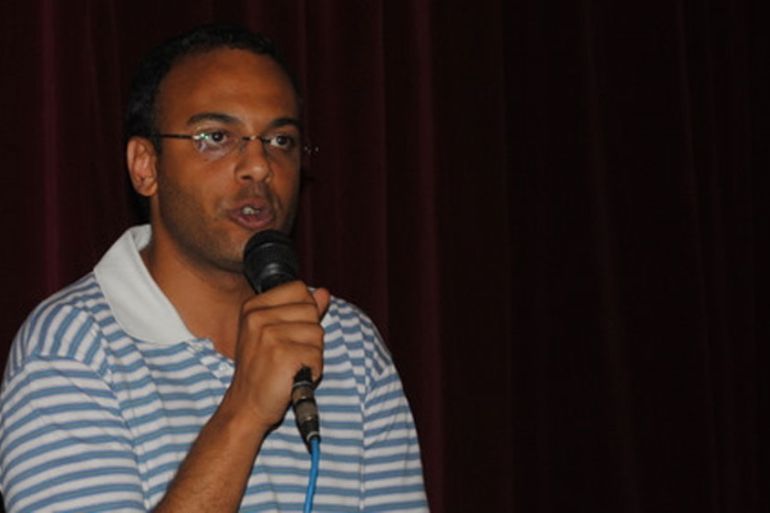Egypt military extends reporter’s arrest amid criticism
Egyptian military prosecutor extends detention of journalist Hossam Bahgat as human rights groups demand his release.

The Egyptian military prosecutor has extended the detention of prominent journalist and human rights advocate Hossam Bahgat for an additional four days, as rights groups across the world call for his immediate release.
|
|
| Inside Story: Why does the West need Sisi? |
Bahgat, who was arrested on Sunday after first receiving a summons order four days earlier, is being held at an unknown location, his lawyers and rights groups said on Monday.
Keep reading
list of 4 itemsTurkey and Egypt call for ceasefire in Gaza
Turkey’s Erdogan, Egypt’s Sisi meet in Cairo
Turkey’s Erdogan arrives in Egypt for first visit in more than a decade
In effect, his detention can be extended an unlimited number of times by four to 15-day intervals.
The military prosecutor has filed charges against Bahgat for spreading “false news”, ostensibly stemming from an investigative report he published at Mada Masr in October.
In that article, Bahgat examined what he called the secret military trial of 26 army officers reportedly plotting a coup.
If found guilty, Bahgat could face up to five years in prison.
RELATED: The British PM, human rights and the Middle East
The Committee to Protect Journalists (CPJ), a New York-based press freedom watchdog, called for the reporter to be released immediately.
Yasmin el-Rifae, the CPJ’s research associate for the Middle East and North Africa, said that Bahgat is one of at least 20 Egyptian journalists currently behind bars.
“This is a record high,” she told Al Jazeera.
Since President Abdel Fattah el-Sisi came to power after the 2013 ouster of democratically elected Mohamed Morsi of the Muslim Brotherhood, Egyptian authorities have cracked down on journalists and press workers.
‘Wide crackdown’
“This is part of a very wide crackdown that’s been going on for a long time now,” Rifae said. “[Egypt’s military] is targeting one of the country’s most prominent investigative journalists at one fo the few independent outlets still reporting.”
According to Rifae, the CPJ worries that the arrest of Bahgat and others like him could have a “chilling effect” on journalists by “telling them not to write about the military”.
“These are issues of public safety and public interest and journalists have every right to write about them,” she added.
Military spokesman Brigadier General Mohamed Samir said that Bahgat had been arrested and sent to the military court for “compromising national security”, according to local media.
Several rights groups echoed the CPJ’s call.
“This is a bellwether moment for Egypt,” Sarah Leah Whitson, Middle East director at Human Rights Watch (HRW), said in a statement on Monday.
RELATED: Who should we trust on the Russian plane crash?
“Continuing to hold Hossam Bahgat or putting him on trial would be a definitive signal that Sisi and his government have no interest in rolling back the repression of the past two years.”

According to HRW, more than 3,700 civilians have been charged in military courts since October 2014, when Sisi expanded the jurisdiction of military courts for a two-year period.
Many of those civilians were charged in the military courts “for acts related to protesting and [alleged affiliation with] the Muslim Brotherhood”.
According to Maya Foa of Reprieve, a London-based human rights group, Bahgat’s case is not unique.
“There is nothing that reflects a solid rule of law and due process in Egypt,” she told Al Jazeera. “The judicial system is a farce and it’s absolutely absurd.”
Foa explained that Egypt’s military courts have sentenced at least 588 people to death since the beginning of 2014, adding that an estimated 72 percent of those sentences were for political protests.
“The idea that this is making the country safer or more secure is a myth,” she said.
‘Hopes dashed’
Before becoming a journalist, Bahgat founded the Egyptian Initiative for Personal Rights (EIPR), a human rights organisation.
The group decried Baghat’s arrest as a “clear signal of the Egyptian authorities’ resolve to continue with their ferocious onslaught against independent journalism and civil society”.
The International Center for Transitional Justice (ICTJ) also demanded that Bahgat be freed, saying that his arrest is part of the Sisi government’s “ongoing crackdown on journalists and demonstrators”.
The ICTJ referred to the accusations as “baseless charges” which “clearly [illustrate] that the hopes of millions of Egyptians for a more just, rights-respecting society have been all but dashed under the current regime”.
While covering protests against Morsi’s ouster in 2013, along with seven colleagues who were outside the country, Al Jazeera journalists Mohamed Fahmy, Baher Mohamed and Peter Greste were accused by Egyptian authorities of spreading “false news”.
Greste, an Australia citizen, was deported from Egypt in February by presidential decree, while Mohamed and Fahmy were pardoned and released in September.
Follow Patrick Strickland on Twitter: @P_Strickland_